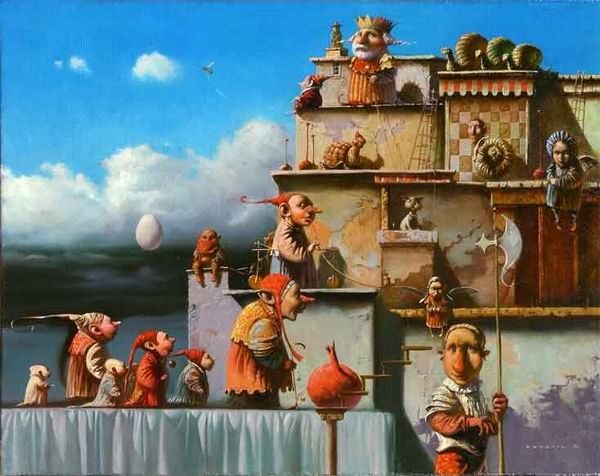
Kotov's Golden Rook
FROM THE ANNALS OF DIRTY GAMES OF CHESS AND POLITICS
Alexander Kotov was a chess mountain. Think his influential "Think like a Grandmaster," or the 1952 Stockholm Interzonal, which he won with a more than brilliant score of 16.5/20, three clear points ahead of Tigran Petrosian and Mark Taimanov in second place, with 8 (eight!) straight wins in the first eight rounds, without losing a game in the tournament.
While I admire Kotov and his major contribution to the game greatly, let us not forget this "combination" outside the chess board which influenced the final ranking on the 1952 Chess Olympiad.
This is my translation from NovayaGazeta.ru, "Kotov, Knight, Rook and Tito," a bizarre story that Evgeny Gik, a Russian chess Master, writer and journalist told Mr. Igor Dvinsky[1] (his account contains some inaccuracies[2] which should not discredit the whole story).
To sum up, a story in which Stalin plots, Kotov and Najdorf execute, Keres laughs, Gligoric and Yugoslavia lose.
Hope you enjoy the story!
* * *
GM Kotov’s phone rang in the middle of the night. Comrade Stalin was on the other side. With his lovely “Oxford” accent he started off, “The boys played good. But there will be no celebration if Yugoslavs finish well. They should not win [Argentina]. Do you understand me?” “Understood, Comrade Stalin”, meowed Kotov. “Very good,” said Stalin and hung up.
There was only one thing left to Kotov: to hang up himself if he did not do something about it. He was smart enough to get it. But what could he do so that Gligoric lost. And Gligoric was to play Najdorf. Najdorf…
At that moment an idea popped up in Kotov’s head. He remembered that Najdorf loved betting. He was always ready to bet on almost anything: tomorrow’s weather, the outcome of the U.S. presidential elections and the number of kittens the famous lioness Margo at the Hamburg Zoo is about to give birth to.
Kotov’s math mind (he graduated from mechanical engineering) immediately told him what a conversation with Najdorf might look like. At the crack of dawn he headed for the hotel where Najdorf was staying and found him while he was doing his morning exercise.
“Miguel, I suggest we bet.” Kotov started, adapting himself to Miguel’s pace.
“On what?” asked Najdorf exhaling.
“I bet you don’t win the game against Gligoric.”
Najdorf stumbled and stopped, “What do you bet on?” he asked.
“My Golden Rook.”
(Just to let you know that at that very 1952 Olympiad opening ceremony, Kotov received the best tournament player of the year award. What’s more, the Golden Rook was of real gold!)
Najdorf agreed to it and put up his heavy gold watch in the bet. They shook hands.
* * *
So the game of the last round began. The following position was reached after 38 moves. Zeitnot. It is Najdorf’s turn.
.

Najdorf-Gligoric, Helsinki 1952 (after 38…d3)
.
Here comes the culmination point of the story. Najdorf played 39.Nxd3, seemingly losing a pawn (39…Nxe4 40.fxe4 Qxe4+ and 41.Qxd3).
With 39.Nxd3 “Najdorf left a pawn en prise in time trouble, and then desperately clutched his head and reached out as if wanting to take the move back. Not having much time to think it over and not suspecting duplicity, Gligoric took the pawn, and soon thereafter lost the game. It transpired that Najdorf had staged the whole pantomime to blunt his opponent’s watchfulness. This can hardly be called ethical,” concludes GM Nikolai Krogius in his book.[3] (Allegedly, Najdorf had done a similar trick with Samuel Reshevsky before.)
The game went 39. Nd3 Ne4 40. Qe3 Qe6 41. Qe4 1-0.
It was a scandal, a provocation actually. The Yugoslav federation filed a protest. The appeal was rejected and the Yugoslavs went home with the bronze (see the top teams, their players and number of points scored in Table 1 at the bottom).
Here is Gligoric’s account (a true gentleman he always was) on what happened:[4]
“Najdorf ‘ the king of South-American chess’ tried to defeat me with White on the top board, but I put up stubborn defense. When, in the decisive phase of the game I was thinking about how to reply, I was unexpectedly subjected to a cheerful conversation in Spanish between Najdorf and somebody else, right behind my back. Nevertheless, I managed to find a good move and Najdorf, as if in a trance, sat down, played his move offering me a pawn and then at once slapped his forehead as if realizing he had just made a ‘blunder’. I naively fell into the trap and, being in time pressure, grabbed the pawn [39…Nxe4??] after which Najdorf grabbed – a whole piece. Even the conservative Paul Keres, who watched the whole scenario, couldn’t stop himself from laughing, and perhaps I would have seen the funny side, too – since the bubbly Najdorf’s childish pranks were in a way cute – if it hadn’t been me who had just been defeated!”
They forgave Kotov the loss of the Golden Rook and he was even given in return a gilded statue of Vladimir Ilyich Lenin! Hooray!
References:
1. Kotov, Knight, Rook and Tito (NovayaGazeta.ru)
Igor Dvinsky Mikhailovich graduated from the Moscow Aviation Institute. He lives in Montreal, Canada.
2. For example, Dvinsky says that the game has been adjourned; that Najdorf checkmated Gligoric, etc.
3. Nikolai Krogius, “Psychology in Chess,’ RHM Press 1976, p.170.
4. Svetozar Gligoric, “I play against pieces”, Batsford 2003
The 1952 Helsinki Olympiad Results (the top five teams)
1 Soviet Union Keres, Smyslov, Bronstein, Geller, Boleslavsky, Kotov 21
2 Argentina Najdorf, J. Bolbochán, Eliskases, Pilnik, Rossetto 19½
3 Yugoslavia Gligorić, Rabar, Trifunović, Pirc, Fuderer, Milić 19
4 Czechoslovakia Filip, Pachman, Šajtar, Kottnauer, Zíta, Pithart 18
5 United States Reshevsky, Evans, Robert Byrne, Bisguier, Koltanowski, Berliner 17
